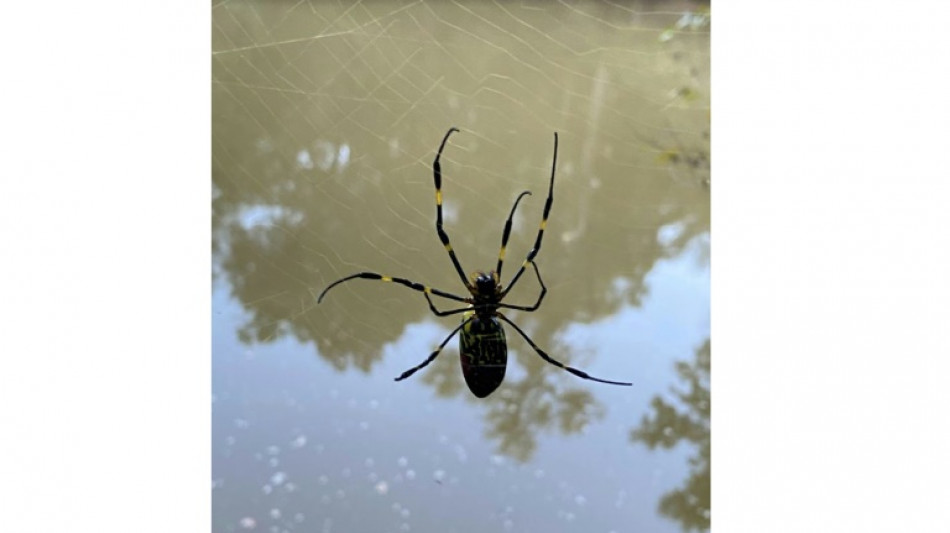
-
 New year brings new mayor for New York City
New year brings new mayor for New York City
-
Netanyahu to meet Trump in Florida for crucial Gaza talks

-
 NBA-best Thunder end skid while Kawhi hits career-high 55
NBA-best Thunder end skid while Kawhi hits career-high 55
-
China launches military drills simulating blockade of Taiwan ports

-
 Myanmar pro-military party 'winning' junta-run poll first phase: source
Myanmar pro-military party 'winning' junta-run poll first phase: source
-
Bondi victims' families demand national probe into antisemitism

-
 Sudanese trek through mountains to escape Kordofan fighting
Sudanese trek through mountains to escape Kordofan fighting
-
Australia coach McDonald backs under-fire MCG curator

-
 South Korea's ex-first lady accused of taking over $200,000 in bribes
South Korea's ex-first lady accused of taking over $200,000 in bribes
-
Pelicans guard Alvarado, Suns center Williams draw bans

-
 China announces 'major' military drills around Taiwan
China announces 'major' military drills around Taiwan
-
Stocks mostly rise, precious metals slip in quiet Asian trade

-
 Injured England quick Atkinson out of 5th Ashes Test
Injured England quick Atkinson out of 5th Ashes Test
-
Bardot: from defending sheep to flirting with the far right

-
 China's BYD poised to overtake Tesla in 2025 EV sales
China's BYD poised to overtake Tesla in 2025 EV sales
-
De Minaur muscles up in bid to be Sinner-Alcaraz 'disruptor'

-
 North Korea tests cruise missiles in show of 'combat readiness'
North Korea tests cruise missiles in show of 'combat readiness'
-
NBA-best Thunder end two-game skid as Raptors win in OT

-
 ASMALLWORLD Brings Luxury Travel Privileges to Klarna's Membership Programme
ASMALLWORLD Brings Luxury Travel Privileges to Klarna's Membership Programme
-
Root says 'silly' to change England management after Ashes loss

-
 Algeria advance to AFCON last-16, Cameroon hold Ivory Coast
Algeria advance to AFCON last-16, Cameroon hold Ivory Coast
-
Diallo scores again as champions Ivory Coast draw with Cameroon

-
 Dupont sparks explosion as Toulouse demolish La Rochelle
Dupont sparks explosion as Toulouse demolish La Rochelle
-
Steelers, Panthers lose to set up showdowns for playoff berths

-
 Inter stay top of Serie A after beating battling Atalanta
Inter stay top of Serie A after beating battling Atalanta
-
Serbia's students gather signatures for early elections goal

-
 Mahrez penalty takes Algeria through to Cup of Nations last 16
Mahrez penalty takes Algeria through to Cup of Nations last 16
-
Third 'Avatar' film stays atop N. American box office rankings

-
 Somaliland recognition prompts celebrations, condemnation
Somaliland recognition prompts celebrations, condemnation
-
Trump says Zelensky and Putin 'serious' in war talks sprint

-
 UK's Starmer under fire over Egyptian activist's 'abhorrent' posts
UK's Starmer under fire over Egyptian activist's 'abhorrent' posts
-
Guinea junta chief headed for victory in presidential vote

-
 Central African Republic president tipped to win third term
Central African Republic president tipped to win third term
-
Spurs deliver big win for Frank as Calvert-Lewin denies Sunderland

-
 Shiffrin produces her 'best, best run' to extend slalom streak
Shiffrin produces her 'best, best run' to extend slalom streak
-
Kyrgios beats Sabalenka in 'Battle of the Sexes'

-
 Calvert-Lewin stretches hot streak as Leeds hold Sunderland
Calvert-Lewin stretches hot streak as Leeds hold Sunderland
-
Liverpool's set-piece problems a 'killer' - Van Dijk

-
 Mozambique end 39-year wait for first AFCON victory
Mozambique end 39-year wait for first AFCON victory
-
The film that created the Bardot 'sex kitten' myth

-
 Former England cricket boss Morris dies aged 62
Former England cricket boss Morris dies aged 62
-
Brigitte Bardot on Muslims, men and 'horrible' humanity

-
 Nkunku breaks Serie A goal duck to fire AC Milan top
Nkunku breaks Serie A goal duck to fire AC Milan top
-
Hakimi to feature in Morocco's final AFCON group game

-
 Bardot: the screen goddess who gave it all up
Bardot: the screen goddess who gave it all up
-
Central African Republic president seeks third term in election

-
 France's screen siren Brigitte Bardot dies at 91
France's screen siren Brigitte Bardot dies at 91
-
French 'legend' Brigitte Bardot dead at 91

-
 French legend Brigitte Bardot dead at 91: foundation
French legend Brigitte Bardot dead at 91: foundation
-
Zelensky looks to close out Ukraine plan in meeting with Trump


Huge spiders to colonize US East Coast, but maybe it's a good thing
Big and scary-looking Joro spiders have spread from Asia to the southern United States and are now poised to colonize the country's cooler climes -- but they're nothing to fear and might end up actually helping local ecosystems.
That's according to scientists who have been studying the arachnid invaders since they first arrived in Georgia around 2013.
In a few short years, the golden webs spun by the bright yellow, dark blue and red spiders -- usually built at head height -- have become a common sight throughout the state, and new research suggests they will clamber up the Eastern Seaboard next.
"The reason we got involved in this project was because they literally fell in our lap," Andy Davis, an ecologist at the University of Georgia, told AFP on Friday.
"They're kind of everywhere here in North Georgia, they're all over my backyard."
Davis set about studying the new resident, comparing it to the golden silk spider, which came to the southeastern US some 160 years ago from the tropics.
Writing in a paper published in the journal Physiological Entomology, he and his co-author Ben Frick found similarities but also striking differences between the relatives.
The Joro spider's metabolic rate is about double that of its cousin, its heart beats 77 percent faster, and it can survive brief freezes.
Together, these traits mean it can better survive colder climates, which is not completely surprising, given that it is native to temperate Japan.
The paper also examined records from iNaturalist, which tracks sightings of animals, and found that the spider's range had already spread far beyond Georgia to encompass the nearby states of South Carolina, North Carolina, and Tennessee. There was even a report from faraway Oklahoma.
Left to themselves, Joros would probably work their way up the coast over 20 years, but it'll probably happen faster if they hitchhike on vehicles, said Davis.
- Call for clemency -
That's likely how they arrived in the United States in the first place -- either a female stowaway laid her eggs when she landed on a ship, or an egg sac was brought over and hatched in spring.
Invasive species are often linked to destruction -- such as the spotted lanternfly, a native of Southeast Asia which came to the US state of Pennsylvania in 2014 and is known to decimate fruit trees and ornamental plants.
But the Joros' exploding numbers aren't necessarily a cause for concern, argued Davis.
"The golden silk spider is everywhere in the southeast, and it's not causing any harm. It's been here so long, it's integrated itself into the ecosystem, and the Joro could follow the same trajectory," he said.
In fact, it could provide a hearty meal for native predators, such as mud dauber wasps, which hunt spiders. Other beneficiaries could include local lizards.
They're also not aggressive towards humans, nor are their fangs big enough to pose any kind of threat, stressed Davis, who called for clemency and understanding, not stigmatization.
"I don't really think the Joros deserve to be squashed or killed like the spotted lanternfly -- they're really not out to get us and it's not their fault either that they're here. They were literally along for the ride," he said.
L.Durand--AMWN



